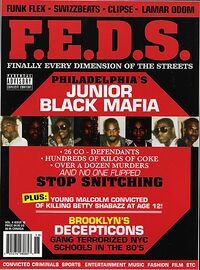Civil Society/Crime/Theme/Junior Black Mafia/Overview

The Italians invented the Mafia. But in Philadelphia at least, the black community perfected it. There was a time in Philadelphia's history where its Black Mafia ran the streets. And despite the best efforts of both state and federal law enforcement, they simply could not find a chink in the armor of the Philadelphia Black Mafia. Through codes of strict loyalty, and violent and deadly reprisals against those so much as suspected of having spoken with law enforcement, the Black Mafia brought the nation's "No Snitching" policy to a matter of literal life or death. Case after case built against members of the city's original Black Mafia eventually fell apart as witnesses were murdered, and key figures refused to barter their knowledge of bigger fish for more lenient sentencing. There was a time in Philadelphia where the Black Mafia was believed to be untouchable, and their hold on the city's criminal underbelly unquestioned. Those days are, for the most part, behind us now.
Founded by a former Black Panther, Samuel Christian who would later change his name to Suleiman Bey upon his conversion to Islam, the Black Mafia began as the black community's answer to organized crime in its neighborhoods. They would routinely extort money from neighborhood craps games at gunpoint, or crash drug deals of other criminal groups in the city. Turning crime on the criminals worked, at first. But eventually the appeal of the money the actual crimes themselves presented proved too great, and having run most of the outside criminal activity from their neighborhoods, they assumed control of those same operations. Principally, they assumed control of Philadelphia's heroin trade, though racketeering, armed robbery, burglary, illegal gambling, and prostitution also helped to line their pockets. By the mid 70's, most of the mob's members had joined the Nation of Islam, giving them the additional sobriquet of the Muslim Mob.
At their height, their members such as Jeremiah Shabazz, claimed ownership of numerous legitimate businesses in West and East Philly. In addition, their membership had turned the local Nation of Islam Masque and Majid into a front for their criminal enterprises. The extortion demanded by one of the Imams actually led to a criminal investigation that pointed directly to corruption and a payoff made to a Democratic ward leader, and then Mayor John Street's Executive Secretary. And while both politicians and the Imam wound up in prison, that was the extent of the investigation's ability to pierce the wall of silence put forth by the Philadelphia Black Mafia. Mayor Street himself even evaded prosecution. In short, the Black Mafia had friends in high places, and for better or worse ran the streets of Philadelphia from the late 60's through to the 1980s.
After a successful federal wiretapping bust brought over 20 Black Mafia members to justice, the organization went through a period of decline. By the late 1980's, the Junior Black Mafia, formed from the children of the original members, rose to replace it. In the age of the RICO Act and a high level of cooperation between state and federal law enforcement, the Junior Black Mafia cannot ever rise to the heights of power enjoyed by their predecessors. But that's just as well. They no longer hold the hubris of thinking themselves untouchable. They're wise to the Fed's wire, and extra careful of whom they trust and for how long. They've opened their membership to independent drug dealers, expanding their market network, and remain a primary hub for heroin trafficking on the east coast, through their influence at the Port of Philadelphia, the nation's fifth largest deep water port.